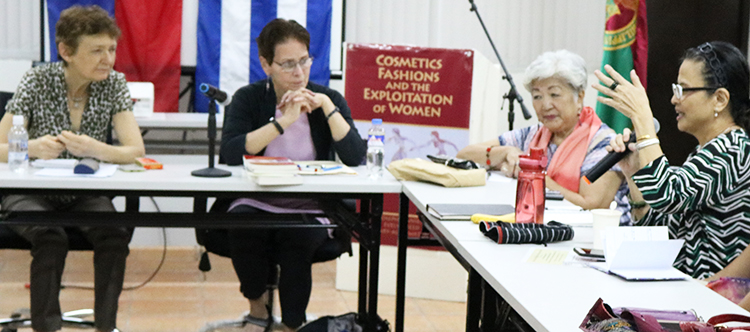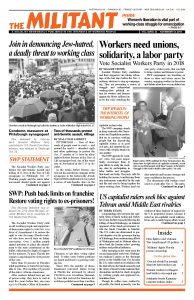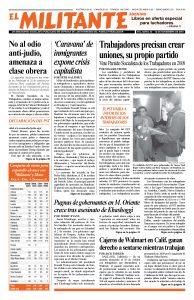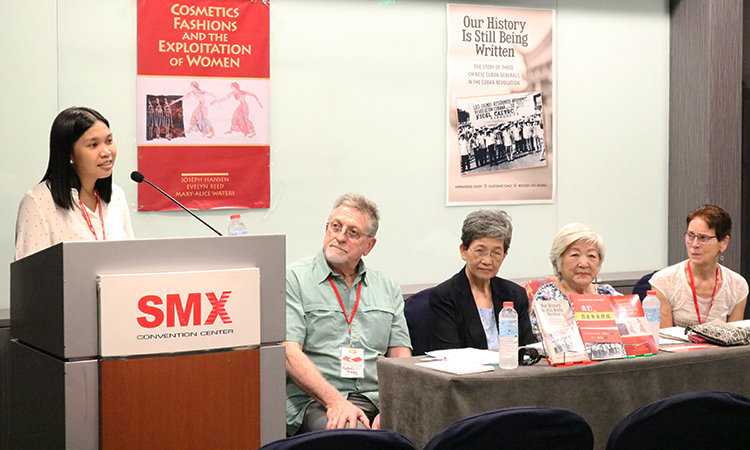MANILA, Philippines — “It’s not a struggle of women against men or men against women. The fight to end all forms of discrimination and degradation of women is a class question. Few issues are more important to the working class as we fight along the road to the emancipation of all humanity,” Mary-Alice Waters, a leader of the Socialist Workers Party in the United States and president of Pathfinder Press, said Sept. 15. She was the keynote speaker at two meetings here presenting the book Cosmetics, Fashions, and the Exploitation of Women, authored by Joseph Hansen, Evelyn Reed and Waters herself.
The first meeting was a panel at the Manila International Book Fair, where Pathfinder had a booth for the first time in several decades. (See article in Oct. 29 Militant issue.) Another of Pathfinder’s most popular titles, Our History Is Still Being Written: The Story of Three Chinese-Cuban Generals in the Cuban Revolution by Armando Choy, Gustavo Chui and Moisés Sío Wong, was also presented at this event. The other meeting was five days later at the University of the Philippines.
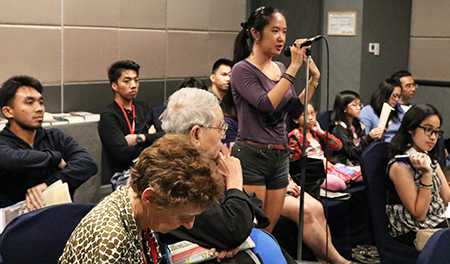
In chairing the book fair presentations, Ron Poulsen of Pathfinder Books and the Communist League in Australia explained why “these two books so seemingly unconnected” were being discussed together. “They bring to life the social forces involved, and the course needed, to politically strengthen and unify the working class to make a socialist revolution, as shown by the Cuban Revolution. Both explain how advancing the involvement and status of millions of women is an acid test for any revolutionary leadership.”
“Cosmetics, Fashions, and the Exploitation of Women contains thought-provoking content on how the economic and social insecurities of women are exploited by the ruling class for profit,” said panelist Shaira Mae Embate. A recent graduate from the Polytechnic University of the Philippines, she is actively involved in political issues from women’s rights to defense of the Cuban Revolution.
In addition to Embate and Waters, the panel featured two other speakers — Teresita Ang See, founder of the Kaisa [Chinese] Heritage Center in Manila and a founding leader of the International Society for the Study of Chinese Overseas; and Ana Maria “Princess” Nemenzo, coordinator of WomanHealth Philippines, convener of the Dignidad electoral coalition, and a leading member of the Philippines-Cuba Cultural and Friendship Association.
Ang See contrasted the different historical circumstances in which significant numbers of Chinese came to Cuba and the Philippines. In the mid-19th century, Chinese were brought as “coolies” — indentured laborers — to toil in Cuba’s sugar plantations, she said. In the Philippines, however, “Chinese didn’t come primarily as part of the laboring class but as traders and merchants.” Pointing to the advances made in uprooting discrimination against Chinese in Cuba, as shown in Our History Is Still Being Written, she noted, “The overall success of the socialist revolution [in Cuba] meant everyone was accepted as part of the national society.”
Adding to Ang See’s remarks, Waters said, “Cuba is the only country in the world where there is no discrimination against descendants of overseas Chinese. The only one! Before the Cuban Revolution, Chinese there were discriminated against as they are in all other countries where large numbers of Chinese settled.
“As Sío Wong says in the book, the reason why Cuba is different from all other countries today is that working people made a genuine socialist revolution in Cuba,” she said. “They eliminated capitalist exploitation, which is the source of that discrimination.”
Capitalist ‘beauty’ standards
Embate, with some humor, related some of her own experiences. “At a very young age, most Filipinas start to believe that being beautiful means having whiter skin and a pointed nose. It’s a huge contradiction to what the organic Filipina looks like — with our kayumanggi or morena [tan or darker] skin color and our not-so-pointed noses.” These social pressures had led her to use skin-whitening products when she was younger, Embate said.
“The unachievable ‘beauty’ standards and the constant pressure on women from advertisements and mass marketing to look a certain way are just one of the many prejudices, fetishes and, as Evelyn Reed puts it in her book, ‘indigestible baits’ of capitalist society to keep us women from taking our rightful place in the revolutionary fight for freedom against the oppressive system that is capitalism.”
Princess Nemenzo, as she is known to everyone, said that she had read some of Reed’s writings decades earlier. “There is no denying that women’s oppression started with the emergence of private property relations when women also became property,” she said. But there is a “continuing debate in the women’s movement over what keeps women oppressed,” with some feminists arguing it comes from a “patriarchal system making women subservient to men.”
“In the labor force we don’t get the same pay and conditions,” she added.
“If biology was women’s destiny we would be confined to the four corners of the house. We’re not baby machines. It is important for us to have control of our reproductive lives,” said Nemenzo.
Concluding the panel talks, Waters said, “Pathfinder has published both these books for the same reason — because they are needed by working people the world over. They help arm us with knowledge of revolutionary struggles of the working class and the political foundations necessary to prepare us to meet the great historical challenge of our epoch — putting an end to the dictatorship of capital.”
She pointed to the Cuban Revolution as “the clearest political example of what the revolutionary mobilization of the working class and its allies can accomplish.”
Why do we feel inferior?
A lively discussion followed the talks at the book fair event. The first speaker stated, “Filipinos hate ourselves — we want to change the color of our skin, our noses, our accent, and rush to leave the country whenever possible. We’re from different ethnic groups. How can we live together and have respect for each other?” This “national inferiority” theme was later echoed in various ways by other participants.
“We’re not born hating ourselves,” Embate answered. “I never thought my skin color was a problem but everything around me told me it was. It’s the capitalist system that makes us feel inferior and prospers if we hate who we are.
“Our struggle is not in any way different from the struggles of working-class people in other countries,” she added. “We may be born in different countries but our experiences are similar.”
Fredda Ruth Rosete, a young Filipina, asked: “I want to be fashionable and to look attractive to the opposite sex. I’ve been told I’m contributing to my own oppression. Is that true?”
“The answer is no!” Waters replied. “But we have to be conscious of the pressures on us generated by the capitalist system and not let that determine our lives. To get a job we not only have to sell our labor power, we have to sell ourselves, to dress the way the bosses demand. But we don’t have to adapt to their values. We have to understand and fight to change class society that so horribly distorts all human relations.”
“In class society it is the ruling class that defines what is beautiful,” Waters added. “They try to impose their morals on all of us. It goes without saying that they see workers as stupid, ugly and immoral.” Cosmetics, Fashions, and the Exploitation of Women helps us understand “that if women’s oppression began with the rise of class society it has not existed for all time,” she said. “If it had a beginning, it will also have an end. And that is what we’re fighting for.”
U.S. class struggle
Another participant commented that he’s heard many Filipinos working in the U.S. are backward politically and are supporters of President Donald Trump. “Filipinos in the U.S. are overwhelmingly working class,” Waters responded. “The liberal bourgeoisie and well-off petty-bourgeois layers consider that anyone who voted for Trump is backward, and a racist to boot.”
“Look at what has happened to the working class in the United States in the last decade and more — from the loss of jobs, homes, pensions, to the toll on working people taken by the wars, the opioid drug crisis, the highest incarceration rate in the world, the deepening class divisions. These things are often not seen from outside the U.S.,” the SWP leader said.
“Millions of working people — of all races and nationalities — refused to vote for Hillary Clinton because they identified her correctly with the policies of all the previous administrations — Democrat and Republican alike — that they held responsible for the devastation of their lives and livelihoods,” she said. “While Clinton contemptuously referred to workers who wouldn’t vote for her as ‘a basket of deplorables,’ Trump — a billionaire — presented himself as an outsider who would tear down the political establishment and reverse all that. He demagogically posed as a champion of working people. Not true! But that’s why he won the election.”
“When we go door to door in working class neighborhoods talking to people about what our class needs to do to confront the crisis we face, there is no difference in the response we get from workers who voted for Trump, or Clinton, or refused to vote for either one,” Waters said.
Embate said she saw similarities between the election of Philippine President Rodrigo Duterte and of Trump. “People here were tired and hurting after 30 years of failed promises by liberal politicians that followed the fall of the Marcos dictatorship. They saw the poverty that is even more rampant now,” she said. “Duterte steered this frustration, this looking for change. We saw the same thing with Trump.”
Fighting together
The second meeting to present Cosmetics, Fashions, and the Exploitation of Women was held Sept. 20 at the University of the Philippines. Waters was joined on the speakers’ platform by Janet Roth from the Communist League in New Zealand.
The event was organized by the Philippines-Cuba Cultural and Friendship Association and the Program on Alternative Development at UP. Eduardo Climaco Tadem, convener of the program, opened the meeting and welcomed the guests.
Roth told of her experiences in the 1980s when members of the Communist League in New Zealand were among a layer of women who fought their way into the more skilled and higher-paid jobs in the meatworks there. The bosses’ divisive policy was to keep these jobs exclusively for men to stoke backward prejudices among some men and keep the workforce divided.
“But women and men fought together to combat discrimination against women and we strengthened our union in the process,” she said. “When we faced harassment from bosses or sometimes male co-workers, we turned to our fellow workers and won many of them and the union to support us. We fought back together. And together we succeeded.”
Roth contrasted this course to that presented by Hillary Clinton, who during a May visit to New Zealand to promote her new book blamed the “ingrained sexism and misogyny” of male workers in the U.S. for her electoral defeat to Donald Trump. “Men or male workers are not the obstacle to women achieving an end to our exploitation,” said Roth. “It is within the working class that we have taken the greatest steps towards equality and where future struggles will advance this even further.”
The presentations by Waters and Roth sparked a lively discussion among the audience of 35, mainly staff and alumni from the University of the Philippines. “Does what you’re saying mean corporate women are no longer our sisters?” asked Jenny Llagano, a writer.
“All women are oppressed as women,” Waters said in answer to this and other questions. “But that doesn’t mean we’re all fighting for the same thing. We have different class roads. Many women believe they can eliminate discrimination by reforming capitalism and shaming men. But we’re fighting to end capitalism, not put Band-Aids on it. Whatever reforms we win will be a byproduct of that struggle. We want to transform all social relations.”
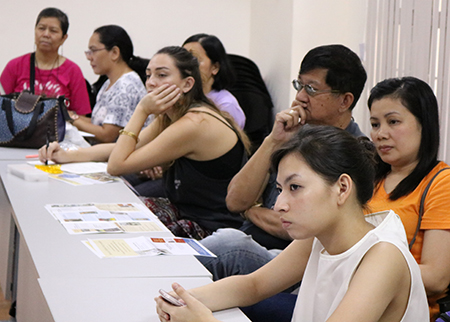
Several of those who spoke said that the discussion convinced them they had to return to dealing more with “class questions” in raising women’s issues.
At both meetings, Waters noted that capitalism has strengthened the working class by incorporating millions of women into the workforce. It has been a historic advance for women and men.
“Our job is to win the vanguard of the working class to an uncompromising struggle against all forms of discrimination, violence, degradation, prejudice, economic and social subjugation,” she said. “Without this there will never be another victorious socialist revolution anywhere.”
